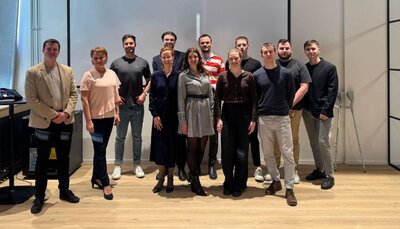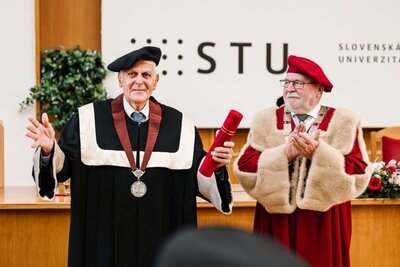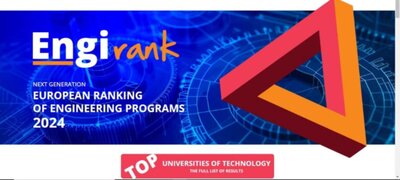

Horizon 2020, Marie Sklodowska – Curie Actions, Individual Fellowships
Expression of Interest for hosting Marie Sklodowska – Curie fellows at Slovak University of Technology in Bratisla
Interested institution:
Department of Mathematics
Institute of Information Engineering, Automation, and Mathematics
Faculty of Chemical and Food Technology
Radlinského 9
812 37 Bratislava
Slovakia
https://www.uiam.sk/?lang=en

Brief Description of the Institution
Slovak University of Technology in Bratislava is a modern educational and scientific institution. Since its foundation in the year 1937 more than 159.000 students have graduated there. In average, 12.000 students study at the STU every year.
At present, STU consists of seven faculties that provide research in a number of research departments and several centres of excellence following a long-term strategy when the priority areas are biotechnology and biocompatibility; sustainable resources and development: energy and raw materials; sustainable resources and development: environment, landscape and urbanism; nanotechnology, nanosciences and multifunctional intelligent materials; information society technologies; life, health and environment; safety, reliability and quality.
All the STU faculties provide study in accredited study programmes within the complex system of bachelor, master and PhD study. Faculties realise credit system compatible with the European credit transfer system enabling mutual mobility of students within European Union member countries and a larger European space. In the area of scientific and research activities the STU successfully joins European Union programmes.
Department of Information Engineering and Process Control of the Faculty of Chemical Technology of the Slovak University of Technology was constituted from the Department of Measuring and Control technique of the Faculty of Electrical Engineering of the Slovak Technical University in 1962. Because of the specific control problems of the processes and systems in the chemical and biochemical technology, the specialisation Process Control in the frame of the study branch Chemical Engineering and Process Control has been established. Students and postgraduate students have been educated since 1964. So far, more than four hundreds specialists and almost forty PhD students have been graduated here and three professors and ten associated professors have been appointed. In 2006 the Department together with the Department of Mathematics established Institute of Information Engineering, Automation, and Mathematics.
Areas of research (as established in Marie Sklodowska Curie Actions): Information Science and Engineering (ENG)
Research / Project Description
- Hybrid modeling and real-time optimization of processes
Modern control architectures comprise elements designed to identify an optimal operating regime of the system, to reduce the uncertainty in key system variables by estimation using measurements (usually corrupted by noise), and to steer the system to the optimal operation regime by dynamic adjustment of available degrees of freedom. Despite these technologies being well understood, there are challenges to be addressed e.g., increased level of system complexity. One way of addressing the challenges is to combine first-principles and data-based modeling, i.e. to use hybrid modeling. As the data-based parts of models bear a significant level of uncertainty, which propagates through the whole control system and, thus, must be considered in the control design. Using the set-based methods, control values can be found to steer the system into an optimal regime in robust fashion while avoiding any violation of restrictions imposed by production quality or safety. The goal of the thesis is thus to innovate control system architecture such that the elements of the control system can exchange information about levels of uncertainty in the signals at their output and the acceptable level of uncertainty in the input signals. The project of the thesis will be finished with a successful demonstration of the developed techniques on a laboratory plant.
- Set-based control of nonlinear systems
As the computers and algorithms get generally faster, many new control concepts become tractable and can be developed. Set-based control is one of these, where the primary use of sets is in enveloping a space of possible evolutions of variables of a system over time. If these envelopes can be obtained in reasonable time, many properties of dynamic systems such as stability or robustness can be reasoned about. The first goal of the thesis is to build a novel type of multi-base set arithmetics that combines elements such as interval analysis, convex-set theory, and polynomial-functions theory to achieve the best trade-off between accuracy of representation and the burden associated with the underlying calculations to obtain the envelopes. The second goal of the thesis is to develop methods of synthesis of controllers that can be used for safe and reliable control of nonlinear systems. The project of the thesis will be finished with a successful demonstration of the developed techniques on a laboratory plant.
Who can apply?
At the deadline for the submission of proposals (11/09/2019), researchers (*):
- shall be in possession of a doctoral degree or have at least four years of full-time equivalent research experience
- must not have resided or carried out their main activities in Slovakia for more than 12 months in the 3 years immediately prior to the abovementioned deadline
Contact person
Dr. Radoslav Paulen,
Associate professor
radoslav.paulen@stuba.sk
Applications: documents to be submitted and deadlines
Please, contact us as soon as possible in order to coordinate the preparation of the proposal.
The following documents will be required:
- Motivation letter
- CV of the applicant
Please note that:
Deadline of the next call for proposals for Marie Sklodowska – Curie Individual Fellowships is September 11th, 2019.
Further contact and information requests will take place directly between the host institutions´supervisor and the interested researchers.
(*) Further details on the Call and additional eligibility criteria can be found at the Funding&tender opportunities Portal https://ec.europa.eu/info/funding-tenders/opportunities/portal/screen/opportunities/topic-details/msca-if-2019



